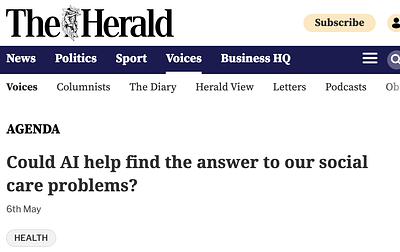
*Article as featured in the Herald

Author: (this will open in a new window)Steve Smith, Principal Consultant
Finding new and innovative ways to support older people is vital. It’s no surprise that for the second year running, our survey of digital leads at UK councils found the majority believe social care is where new technology can have the greatest impact.
Smart technology, assisted by artificial intelligence, has the potential to revolutionise social care by improving quality and efficiency, while also empowering people to live independently for longer.
Wearable devices and sensors can be used to collect health and wellbeing data, from activity levels to blood sugar monitoring. Such data can be used to identify potential problems and intervene early.
Sensors installed in everyday appliances, like kettles, could alert family if their loved one suddenly isn’t making their daily cups of tea. Voice assistants can help control appliances, remind people to take medications, help schedule appointments, or simply reduce the feeling of loneliness or isolation.
These are just a few available innovations, with more being developed all the time. However, simply having abundant data from smart devices is not a solution; the real benefits stem from analysing and using this data to enhance the support on offer.
That’s where AI, which is increasingly being used to interpret the data gathered by smart devices, can play a role. It can quickly identify trends and patterns that can be used to improve the quality of care.
AI could potentially predict when older people living in their own homes are at risk of a fall, or give early warnings when someone’s health condition is worsening.
Similar to the opportunities offered by smart meters, people could view their health data on a display screen or mobile device, and easily see the results of small adjustments to their daily routine in terms of their health.
Of course, all of this is useless unless organisations act effectively on the insights AI provides. Social care systems are typically reactive, rather than focused on preventative intervention. The single biggest barrier to success is the significant cultural change needed to fully realise the benefits these technologies can offer.
For example, AI could recommend actions or interventions to social workers based on data analysis and best practices, or assess the level of risk in different cases. Within social care systems, AI could analyse data and allocate resources to areas where that data says they are most needed. This could reduce waiting times and improve access to services.
The other vitally important element is security and governance. Used correctly, such personal data can be transformational, but this needs to be carefully managed to ensure it is only used for the intended purpose. People must have the confidence their data is secure before they will allow these systems into their lives.
And the more people understand its potential, the more can be achieved in enabling people to live better, safer, and more independent lives.
Interested in how FarrPoint's services could help you maximise the positive impact of technology in social care? Get in touch or view our Services page.
Connectivity is important. It drives business and society, bringing communities and commerce together. That's why we use our insight and experience to connect people and business.